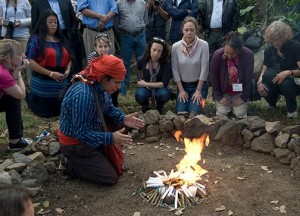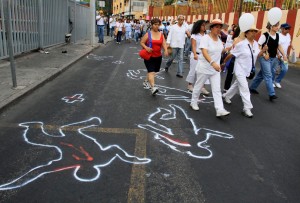There are many kinds of war. The classic image of a uniformed soldier kissing mom good-bye to risk his life on the battlefield has changed dramatically. In today’s wars, it’s more likely that mom will be the one killed.
The UNDP states that by the mid-1990s, 90% of war casualties were civilians– mostly women and children.
Mexico’s drug war is a good example of the new wars on civilian populations that blur the lines between combatants and place entire societies in the line of fire. Of the more than 50,000 people killed in drug war-related violence, the vast majority are civilians. President Felipe Calderón claims that 90% of the victims were linked to drug cartels. But how does he know? In a country where only 2% of crimes are investigated, tried, and sentenced, the government pulled this figure out of its sleeve.
There is no official information on why these thousands were killed. When their bodies are found in unmarked mass graves, no one even knows who they were. With violence the norm, executions can —and do— target grassroots leaders, human rights defenders, indigenous peoples, and rebellious youth under the cloak of the drug war.
Not Just Homicide
There are also war tolls beyond the body counts. The homicide number misses the disappeared, the thousands whose bodies–dead or alive–are never found, never counted. And it hides the mutilation of lives caused by “collateral damage”: the loss of loved ones, families forced from their homes, permanent injury, orphans and widows, sexual abuse, lives lived in fear.
These costs fall primarily on the shoulders of women–the mothers, daughters, and sisters who are left with the nearly impossible task of seeking answers and redress in a justice system outpaced by violence and overrun by corruption. They are often re-victimized by government agencies that ignore, reject, or stifle their pleas for justice.
“Families that demand that our children be found face all kinds of threats… the loss of our property, isolation, rejection by our own families,” said Araceli Rodríguez, a mother whose son, a young policeman, was disappeared on the job. His police unit refuses to give information on his disappearance. “I wake up and find that it’s not a nightmare, that his absence is real and the impunity is also real.”
It’s rare to hear the voices of the women who bear the brunt of the drug war. Their pain doesn’t make headlines. Some need anonymity to remain alive. Many have been granted protective measures by the government or international human rights organizations because of the extreme threats they face.
Telling Stories
Despite all these difficulties, some 70 women told their stories amid tears and despite fear for their lives in Mexico City on January 22. The meeting called by the Nobel Women’s Initiative brought an international delegation led by Nobel Peace Prize winner Jody Williams together with Mexican women victims of the violence and women human rights defenders.
From the sketchy statistics available, women make up a relatively small proportion of the murdered in Mexico, but they are the majority of citizens who denounce disappearances, murders, and human rights violations in the drug war. They work on the front lines of defending communities and human rights. For their efforts, they become targets themselves. In Mexico, six prominent women human rights defenders have been murdered in the past two years.
The last report by the UN Special Rapporteur on the situation of human rights defenders recognized that threats and especially “explicit death threats against women human rights defenders are one of the main forms of violence in the region, with more than half coming from Latin America, most of those (27) from Mexico.”
Sometimes it’s the drug cartels that seek to silence women activists. But a recent survey of Mexican women human rights defenders revealed that they cite the government (national, state, and local) and its security forces as responsible in 55% of cases of violence and threats of violence to women defenders. Among government officials charged with public safety and justice, they encounter at best indifference and at worst death threats and attacks. A human rights defender from the state of Coahuila explained that searching for a disappeared loved one implies “always having to be in the hell of the institutions, which are often infiltrated by crime.”
Gender-based violence including femicide has skyrocketed in the context of the overall violence. The number of femicides in Chihuahua since sending the army in has risen to 837 for the period of 2008- June 2011 —nearly double the total femicides in 1993-2007. Women rights defenders report that the vast majority of threats and acts of violence against them include gender-based violence.
Silent No More
Olga Esparza, whose daughter Monica disappeared in Ciudad Juarez in 2009, explains through her tears that the government simply doesn’t care. “We’re the ones who have to carry out the investigations, with our own resources.” She adds that government officials often add insult to injury, “They say she’s probably just gone off with her boyfriend or she’s a prostitute or drug addict.” In her case, as with so many others, there’s no investigation, no results, no justice.
Another woman described how her work with indigenous communities led to her rape and torture by police agents. She continues to live in terror due to threats against her life and her family.
Alma Gomez of the Center for the Human Rights of Women in Chihuahua summed up what she sees in the center, “Women are the invisible victims, we are always at risk in this military and police occupation. We know of gang rapes by security forces that the women don’t even report; arbitrary arrests; women who make the rounds between army barracks and city morgues searching for their sons, fathers, or husbands. We are the spoils of war in a war we didn’t ask for and we don’t want.”
“Victim” is really the wrong word for these women. The mother whose son disappeared more than two years ago said, “In the struggle to find my son, I joined the peace movement. I learned that I can transform my pain into a collective force and together we can help more people to have a voice and to now be empowered to defend their rights.”
 Valentina Rosendo, a Me’phaa indigenous woman from the State of Guerrero, was raped by soldiers and took her case all the way up to the Interamerican Court of Human Rights. She sums up the reason for participating in the Nobel Women’s forum, “It’s really hard to speak out, but it’s more painful to keep quiet.”
Valentina Rosendo, a Me’phaa indigenous woman from the State of Guerrero, was raped by soldiers and took her case all the way up to the Interamerican Court of Human Rights. She sums up the reason for participating in the Nobel Women’s forum, “It’s really hard to speak out, but it’s more painful to keep quiet.”
Laura Carlsen is the Director of the Americas Program and is currently corresponding from the Nobel Women’s Delegation as it tours Mexico, Honduras, and Guatemala.




